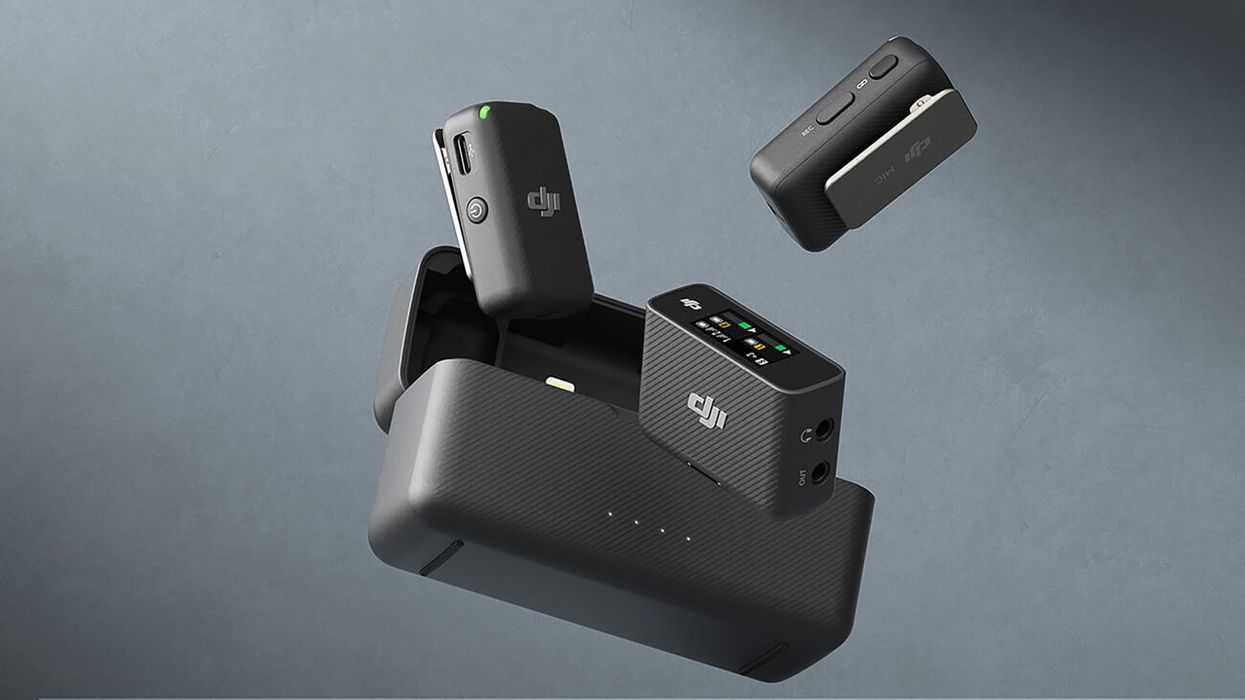The DJI Mic Is Finally Here to Listen
After its announcement in late 2021, the DJI Mic has finally arrived. But can the drone company pivot into a new market without stumbling?

DJI is known for its drones and gimbals, for both professional and prosumer use. But after cementing its position as a budget-friendly alternative to the MOVI from Freefly Systems, the company has finally set its eyes on audio.
Unlike the Ronin 4D, which broke into the camera world like the Kool-Aid Man, the DJI Mic is a subtle move into the audio space. The new product focuses on interviews or vlogging content with a design reminiscent of Airpods or other wireless earbuds.
DJI is clearly showing a focus on the creator market, but how does the DJI Mic stand up to the RØDE Wireless Go II, and can you use it in a professional setting? Let’s find out.

A Wireless Audio Solution
The entire DJI Mic package consists of two transmitters and one receiver, neatly tucked into an Airpods-style charging case.
The transmitters and receiver are automatically paired when popped into the case, which is a nice touch and DJI claims a total battery life of 15 hours with the charging case. Without it, the transmitter is said to run for 5.5 hours, while the receiver will hold out for only 5 hours.
Each transmitter is about the size of a RØDE Wireless Go II, but has a slightly different shape. To attach the transmitters, creatives can use the provided clip or the hearty detachable magnet.

Both have built-in mics that support omnidirectional audio and internal storage of 8GB for recording without the receiver. There’s also a 3.5mm TRS input on each transmitter for pulling audio from external sources.
While internal storage is nice, 8GB won’t give you much recording time, and the system will overwrite the earliest recorded audio if the storage is filled up.
For wireless transmission, the DJI Mic uses a 2.4GHz frequency band with a range of just over 800ft, at least according to DJI. The downside is that Bluetooth and WiFi also use this band, so if you’re in an area with heavy traffic, you’ll definitely get interference.

The single receiver has a built-in touch screen display. It’s small and, to keep with the Apple theme, reminds us of the touchscreen iPod Nano. However, all the necessary presets and settings are available in a fairly usable UI that fits comfortably onto the small screen.
To send audio out, the receiver has a 3.5 TRS output, a headphone jack, and a USB-C port for connecting to a computer or compatible device.
Should You Buy It?
The DJI Mic is an interesting device that focuses on usability and maintaining a small footprint. While audio manufacturers have come a long way since the days of bulky audio packs with LAV mics, DJI is aiming for the competition with an innovative design.
DJI Mic

- 2 x Transmitters, 1 x Receiver
- Up to 820' Wireless Range
- Portable Charging Case
- 3.5mm TRS to USB Adapters
- Carrying Pouch, 2 x Wind Socks
However, the reliance on 2.4GHz and low internal storage that overwrites your audio when it gets full makes this more of a prosumer unit than a professional one. While it is marketed toward digital creators, with a few tweaks, the DJI Mic could find a home in a fast-paced professional setting.
In a pinch, it could even do the job now.
Check out weekly specials, deals, and rebates: Pro Video Gear, Pro Audio Gear, Lighting
Source: Fstoppers











